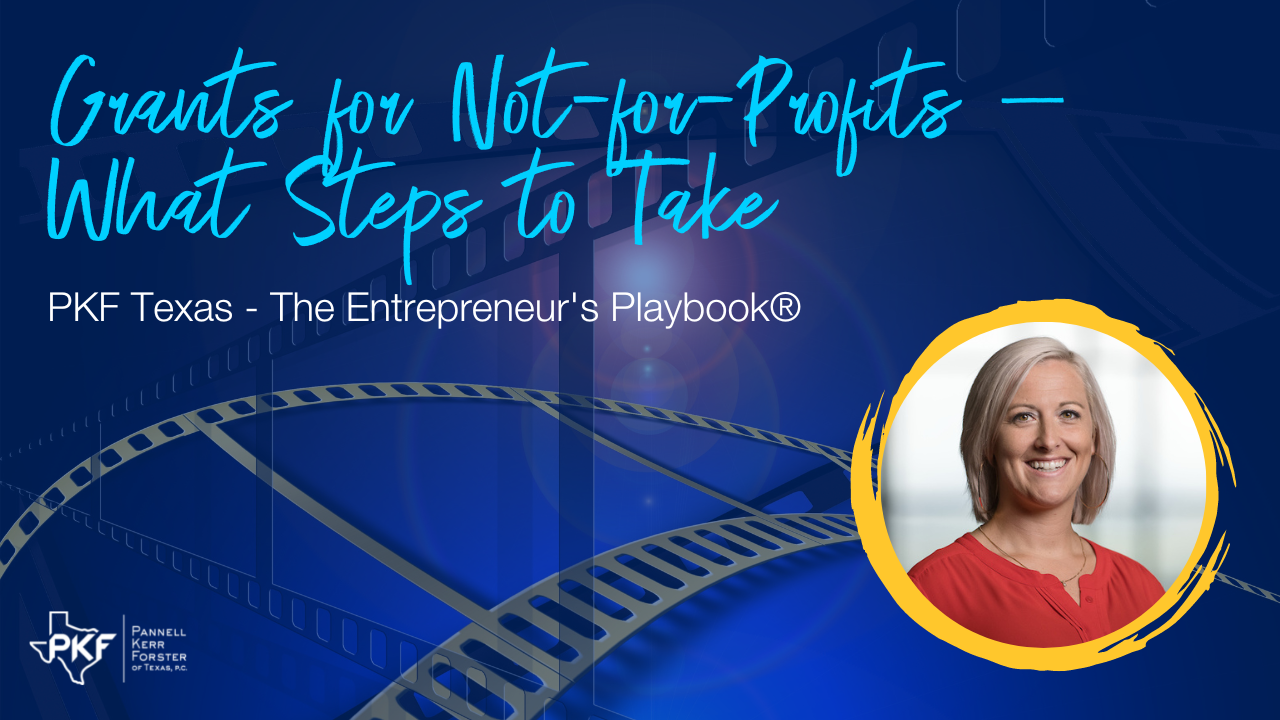Grants for Not-for-Profits – What Steps to Take

“Grants” is a broad term used universally but can mean different things for not-for-profits. Make sure you understand what grant you need to account for and what steps to take. In the next PKF Texas – The Entrepreneur’s Playbook® Audit Director, Nicole Riley, CPA, breaks down the steps your organization needs to consider when it comes to grant accounting.
Jen: This is the PKF Texas – Entrepreneur’s Playbook®. I’m Jen Lemanski, and I’m back again with Nicole Riley, an Audit Director and one of our Approachable Advisors™ here at PKF Texas. Nicole, thanks for coming back to see us.
Nicole: Absolutely.
Jen: So, I know many not-for-profits receive grants, so why is it so difficult to account for these grants and what should they know?
The Type of Grants
Nicole: So, grants is such a very broad term and it’s used very universally. You have somebody call a grant that’s really just a check showed up in the mail for operating expenses; “Thank you. Here you go.”
You have another person that says, “Here’s a grant,” but it has 15 pages of requirements. It’s very specific and you have to follow certain cost circulars to be reimbursed for it.
And then you have somebody might call it a grant, but it’s more like a service provider where you’re actually providing a service back to the grant, like IT service or implementing some kind of software.
All of those things are being called “grants” and each of them is a lot different.
Accounting for the Various Grants
Jen: So, then would you account for them in different ways?
Nicole: You know, those three I gave you have three different accounting treatments. And that’s exactly why it gets complicated, and it’s pretty technical guidance. And there’s a lot of gray area and I really have to guide clients through this and have them put all the information out there. You kind of have to put it on a scale and say, “Okay, what’s really more important?” What’s more significant when you’re evaluating it?
But in general, your first step in the process is to then look at it and say, “Okay, am I giving the grantor a commiserate value? Are they getting from me what they’re paying me? Is it a service?” Similar to a for-profit kind of thing. And if that’s the case, you actually follow what for-profits follow as far as revenue guidance. So that would be step one.
And now if that’s not the case, you go on to step two. And the second step is to really look at it and say, “Do I have what’s called an ‘unconditional contribution’ or a ‘conditional contribution?’” And you have to look at those factors because if it’s conditional, you don’t record the revenue then; you have to wait. And once it’s unconditional, you record that revenue. So, it can be very, very different timing. And then, once you do have an unconditional contribution, you get to the third fork in the road.
Jen: Gosh.
Nicole: Like I said: it doesn’t get easy does it? That third fork in the road is really… you have to look at it and say, “Do we have an unrestricted or restricted contribution?” So, just because it says grant, you could be at any one of these things along the way. And it does get a little tricky.
Jen: I was going to say, there sounds like there’s a lot of, to quote one of my favorite movies, “a lot of ins and outs and what have yous” for these not-for-profits to consider.
Nicole: Absolutely.
How We Can Help with Grants
Jen: And they need advice.
Nicole: And this is something that we do on a regular basis. We have to really help them along the way. And we like to be an advisor and help them figure these things out as they get them. Because every agreement actually has to be evaluated. Unfortunately, a for-profit has a pretty much one– they have some– but usually they are all the same. Whereas, every grant and every agreement the nonprofit gets, they have to read and do this evaluation and most importantly document the decisions that they made.
Jen: So, document, document, document.
Nicole: Absolutely.
Jen: Perfect. Well, we’ll get you back to talk a little bit more about things impacting not-for-profits. Sound good?
Nicole: Sounds great.
Jen: This has been another thought leadership production brought to you by PKF Texas – The Entrepreneur’s Playbook®. For more information about this and other topics, visit www.pkftexas.com/NotForProfit. Tune in next week for another chapter.

